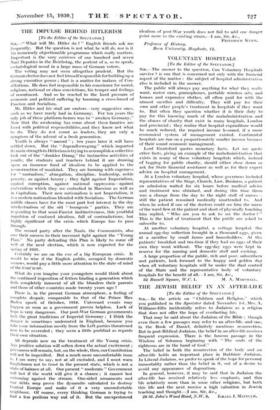VOLUNTARY HOSPITALS
[To the Editor of the SPECTATOR.] Sin,—The answer to the question, Can Voluntary Hospitals survive ? is one that is concerned not only with the financial aspect of the matter : the subject of hospital administration also is included in the answer.
The public will always pay anything for what they really want, motor cars, gramophones, portable wireless sets, and houses and expensive clothes, all often paid for with the utmost sacrifice and difficulty. They will pay for their own and other people's treatment in hospitals if they want to. But often they question whether it is their duty to pay for this knowing much of the maladministration and the abuses of charity that exist in many hospitals, London and provincial ; they realize that hospital expenditure would be much reduced, the required income lessened, if a more economical system of management existed. Continental hospitals are run on a proportionately smaller income because of their sound economic management.
Lord linutsford quotes monetary facts. Let use quote other facts, giving an example of the maladministration that exists in many of these voluntary hospitals which, instead of begging for public charity, should- either close down or ask for State financial assistance as well as for their expert advice on hospital management.
At a London voluntary hospital, whose governors included representatives of the Stage, Church, Law, Business, a patient on admission waited for six hours before medical advice and treatment was obtained, and during this time thero was a change from the day to the night staff of nurses— still the patient remained medically unattended to. And when he asked if one of the doctors could sec him the nurse of the ward flew at the patient and short of physically touching him replied, " Who are you to ask to see the doctor ? " This is the kind of treatment that the public arc asked to subscribe to.
At another voluntary hospital, a cottage hospital, the annual egg-day collection brought in a thousand eggs, given at a sacrifice by small farms and householders. At tha patients' breakfast and tea-time if they had no eggs of their Own they went without. The egg-day eggs were kept in reserve for the nursing and domestic staff and cooking.
A large proportion of the public, rich and poor, subscribers and patients, look forward to the happy and golden day when all voluntary hospitals will be under the dual control of the State and the representative body of voluntary hospitals for the benefit of all.—I am, Sir, &c.,








































 Previous page
Previous page